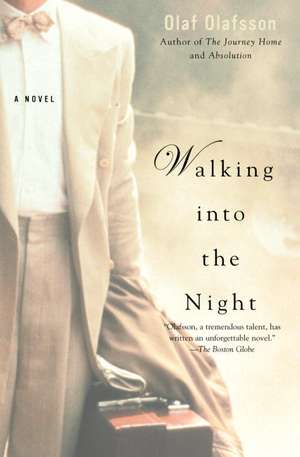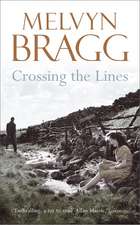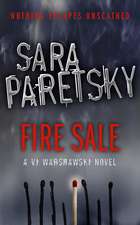Walking Into the Night
Autor Olaf Olafssonen Limba Engleză Paperback – 30 sep 2004
Preț: 100.76 lei
Nou
Puncte Express: 151
Preț estimativ în valută:
19.28€ • 20.06$ • 15.92£
19.28€ • 20.06$ • 15.92£
Carte tipărită la comandă
Livrare economică 12-26 aprilie
Preluare comenzi: 021 569.72.76
Specificații
ISBN-13: 9781400034802
ISBN-10: 1400034809
Pagini: 272
Dimensiuni: 133 x 204 x 15 mm
Greutate: 0.21 kg
Editura: Anchor Books
ISBN-10: 1400034809
Pagini: 272
Dimensiuni: 133 x 204 x 15 mm
Greutate: 0.21 kg
Editura: Anchor Books
Notă biografică
Olaf Olafsson was born in Reykjavik, Iceland, in 1962, and studied physics as a Wien Scholar at Brandeis University. He is the author of two previous novels, The Journey Home and Absolution, which have been translated into fourteen languages. He lives in New York with his wife and two sons.
Extras
The cypress rested in its shadow.
He tripped on the steps up to the main building but managed not to fall. Fuchsia blossoms met his eye as he straightened up; azaleas beyond them. He walked over to the cypress and leaned against it while he caught his breath. He was hot in his black suit in the afternoon sun. Reaching into his pocket, he took out a white handkerchief to mop his brow and pat his cheeks. Fairweather clouds hovered on the horizon, while closer to shore gleaming ripples tossed back and forth. He sensed a breeze, and suddenly a sharp whistling sound passed through the trees and a bell clanged in one of the towers. Once, then silence. He noticed a hint of lavender as he put the handkerchief back in his pocket and continued on his way.
The Chief had mislaid his magnifying glass. Kristjan--or, rather, Christian Benediktsson, as he had called himself since coming to this country during the Great War, twenty years ago--had spent the morning hunting for it in the old man's bedroom and on the balcony outside, in the gothic library next door and down in the reception room, Þrst by the teletype machine, then on the jigsaw-puzzle and chess tables, but without success. He had paused in his search for a moment when the teletype suddenly began to hum, and hesitated before the machine, waiting for the message the Chief had been expecting.
"What on earth can have happened to that magnifying glass, Christian?" asked the old man as his butler handed him the telegram and reported his failure. The Chief glanced at the message, then went to the window and said: "Unless I left it outside yesterday."
Kristjan thought he remembered seeing his employer wandering around the previous afternoon with a book in his hand, Dickens, he believed, as it had the same leather binding as the collected works. Oliver Twist had been lying on the Chief's bedside table yesterday morning but was there no longer, so it seemed likely to have been the one. He had looked round all the guest-houses, by the Neptune Pool, in the billiards room, where he remembered seeing the Chief sitting for a while before sunset yesterday, by the fountain with the statue of David, and in Miss Davies' room, though she hadn't been there for over a week and wasn't expected until next weekend, when the Chief was planning a costume ball.
Had he thoroughly checked by the swimming pool? He stopped in his tracks, trying to remember whether he'd looked under the table on the side where the old man usually sat. He didn't move on again until he'd convinced himself that he had missed nothing.
The magnifying glass was of medium size, with an ivory handle gilt-embossed with the Chief's initials: WRH. He had borne it a grudge ever since the Chief fell asleep in his poolside chair last year with a book on his lap, the magnifying glass clutched in his right hand over an open page. Kristjan had been in the house fetching a cold drink for Miss Davies when he heard the screams.
He set off immediately at a trot, trying to balance the drink on its silver tray, through sunbeams and shadows, and dropped the glass at the sight of the Chief lurching to his feet with his jacket in þames. The book lay burning on the edge of the pool at his feet but he was still clutching the magnifying glass. He seemed dazed with sleep, so Kristjan grabbed him round the waist and leaped into the pool with him.
It was remarkable that the Chief had only slightly singed the back of his right hand but otherwise escaped unharmed. Once he'd grasped what had happened, he stroked his shirt where it had caught Þre, and said:
"Where were you?"
Kristjan put an arm under his shoulder and helped him up onto the side of the pool, where Miss Davies was waiting for them. The gardener and two girls from the kitchen, who had rushed out when they heard the screams, now retreated out of sight so the Chief wouldn't realize they had witnessed his humiliation.
"Where were you?" he repeated.
"He was just fetching me some lemonade, dear."
She helped him indoors while Kristjan swept up the charred remains of the book and picked up pieces of glass from the path where he had dropped the drink. He worked methodically, taking care not to cut his Þngers or burn himself on the still smoldering book. Oliver Twist, a Þrst edition, bound in light-brown leather. Before going inside to change, he emptied the water from his shoes.
Kristjan quickened his pace. The hunt for the magnifying glass had disrupted his day. He pulled the watch from his pocket and squinted at it. Half past two. Monday-May 17th. "San Simeon, May 22nd, 1937," was engraved at the top of the menu for Saturday night's dinner. He'd found two spelling errors and had them corrected. The Chief's shoes were waiting to be polished and he still had to make a clean copy of the guest list for the costume ball. A cool draft sneaked from the shadows, and for a moment he imagined someone was breathing on his neck. He started.
"Klara," he whispered. "Is that you again?"
It was by accident that he found it on his way back to the house. A glimmer caught his eye on his way past the four statues of Sekhmet, the lion-faced Egyptian goddess of war and battle; a þicker on the balcony behind her. What a relief! He couldn't wait to bring it to the Chief.
He wiped the dust off the handle and polished the glass with his handkerchief as he hurried back to the main building. It was getting cooler but he didn't notice. In the distance the sky was darkening. A whistling breeze swept over the hill but the cypress caught it. The bell clanged. He knew the Chief would be pleased to see his magnifying glass again.
He lay on his back covered by a thin sheet. It was still hot; he slept naked. The window was open but in the corner a dim light burned; he had switched it on before getting into bed. For years he had been unable to sleep in the dark.
The lion in the Chief's zoo had been restless tonight. He imagined it pacing in its cage. In his dream he saw fog over the bay and mist on the hillsides; in the moonlight it looked like newly fallen snow.
He slept lightly, his hands resting at his sides. The glow cast by the lamp crawled up the sheet, fading out over his chest and leaving his face in darkness, apart from a splash of light on his forehead. He was nearing Þfty but people still commented on his striking looks. Fair, broad shouldered, of medium height, his hands powerful despite the long, Þne Þngers. He still had to restrain his thick, wiry hair.
His room was two doors down the hallway from Mr. Hearst's bedroom. He had not spent a single night in the servant's quarters since he Þrst came here, for the Chief wanted him close by. He usually slept with his door ajar so he could hear if the old man called for him. Tonight, however, he had shut it as Mr. Hearst was away and not due back until tomorrow. But Miss Davies had appeared just before supper, taking everyone by surprise. They had thought she would be in Los Angeles until Friday. She was alone.
Tomorrow morning a ship was due to dock at the San Simeon quay, carrying iron, cement, and steel. The Chief had asked him to supervise the unloading, as he suspected he had been cheated on the last consignment. Kristjan was looking forward to spending the day down by the sea.
The smell of the ocean came through the window and he turned his head towards it as if he sensed it in his sleep. The Þngers of his left hand twitched a little, then his body grew calm again and his breathing slowed and became regular, though now and then his eyelids þickered. Lately his dreams had taken him to the small village in Iceland where he'd grown up. To the jetty and the mountain behind the village. He had no idea why and didn't think his dreams were of any signiÞcance.
He didn't wake up when she opened the door and entered. Leaving it ajar behind her, she stopped by his bed and looked at him. The curtains þuttered; the shape of his body was visible under the sheet.
Gradually Kristjan became aware of her presence, though she remained where she was without moving, simply watching him. Slowly he opened his eyes, blinking as he grew accustomed to the light, then turned his head in her direction.
"Is that you?" he asked.
She was wearing a white silk robe, her arms folded. She wore her strawberry blond hair long, in þowing curls. Her eyes were bright blue, her smile girlish when she wanted it to be. She held a cigarette in a holder between her index and middle Þngers, as if she had forgotten it was there. Her Þngers were short and pink, the holder long and white with a gold ring around the end that held the cigarette.
"What did you say?" she asked quietly. "Was that Icelandic?"
It took him a while to shrug off his sleep, as though something was dragging at him from the depths of a dream.
"Oh, it's you, Miss Davies," he said at last. "Is something wrong?"
"There's nothing wrong."
If she reached out her hand she could brush against his skin. They were both aware of this.
"Who did you think it was?"
"I was dreaming..."
"About who?"
He didn't answer.
"A woman?"
He rose up on his elbow.
"I was dreaming. Is there something wrong?"
She smiled. Her own smile, not a smile from one of her movies.
"I wanted the guest list for Saturday. If you wouldn't mind..."
He stretched under the sheet, looking at her abstractedly, a white Þgure in the quiet half-darkness.
"It's down in the kitchen. I'll go get it."
She didn't move.
"I'll bring it to you..."
He smelled her breath as she Þnally turned her back on him and went to the door. He wasn't surprised that she had managed to get her hands on a bottle; the Chief wasn't home to keep an eye on her. The smell was faint and not unpleasant.
She turned at the door.
"Christian," she said. "I can't sleep. The lion's been roaring all night. Can you do something about it?"
She was ten years younger than Kristjan, twenty-Þve years younger than Hearst, who had met her when she was an eighteen-year-old chorus girl on Broadway. He was still married to his wife, who was living on the East Coast. They had Þve sons. Miss Davies was now a movie star.
"I'll get the list," he said. "Then I think you should try to get some sleep."
He stepped slowly out of bed when she had gone and stood by the window for a long time before pulling on his clothes.
The lion was silent again.
San Simeon, May 20, 1937
My darling Elisabet!
I haven't forgotten my promise to try to explain what happened. It's going to be difÞcult, that's for certain, because I often doubt if I understand it myself. By saying this I'm not trying to excuse myself, you mustn't think that. I know that you deserve better.
He wrote slowly, putting down the pen from time to time, screwing on the cap, his eyes distracted, as if he were trying to remember the nuances of a voice that had long since fallen silent. He sat like this for a long while, until at last he grew restless in his seat and strained his ears. He had opened the door to the balcony; a warm breeze lifted the paper on the table before him, then set it down again, carefully as if not to disturb him. The windows and balcony door were open, creating a cross-draft for the Chief, who was having trouble again with his breathing that night.
"My darling Elisabet," he wrote without hesitation. He had changed the salutation in the Þrst two letters as well, so they would all begin in the same way. For a long time he had been unsure whether to use that delicate word--darling, whether it would seem impertinent or arrogant. Perhaps this was why he had given up when he Þrst tried to write to her nearly four years ago. It had disturbed him that he had not even been able to Þnd a way to address her. But now he was comfortable with the word and could place it before her name effortlessly, even with enjoyment, Þnding it a source of solace, murmuring the words softly like a prayer.
He had written the Þrst letter about a month ago. This was the third.
This morning, when I was taking the Chief his breakfast out on what's known as the Tea Terrace, I suddenly started thinking about our Þrst year at Eyrarbakki. When was it--1908? 1909? It was 1909, wasn't it? Completely out of the blue I remembered our morning walks along the beach before I went to the ofÞce and you sat down at the piano. I was wondering whether we really took those walks every day, but can't quite remember, though I'm pretty sure it must have been at least every other day. I'm sure we used to walk along the beach whatever the time of year; yet I can only picture us in brilliant sunshine...
He suddenly lost the thread, feeling for a moment suspended in midair. He had been about to recall how small he had found Eyrarbakki after his return from Copenhagen, how he had wanted them to move directly to Reykjavik. These Icelandic villages, he had thought to himself, everyone with their nose in everybody else's business, like a little prison in the midst of the great empty landscape. But he stopped himself. These letters to Elisabet were hardly the right place for such reþections. No, I must keep a hold on myself, he thought, I mustn't let myself get agitated.
He stood up to calm his mind. He heard footsteps on the terrace, went out onto the balcony and watched one of the kitchen girls walking down the hill. "It was the footsteps," he told himself, "that's what distracted me." They faded but he could still hear the crunching of sand on a beach.
I seem to remember that we still took our morning walks when you were pregnant with Einar, at least during the Þrst few months, but I can't remember whether we stopped altogether after that or started again later on. Somehow I think we gave up the habit before Maria was born, as it was not long afterwards that we moved to Reykjavik. In 1912. God, it's all such a long time ago.
He tripped on the steps up to the main building but managed not to fall. Fuchsia blossoms met his eye as he straightened up; azaleas beyond them. He walked over to the cypress and leaned against it while he caught his breath. He was hot in his black suit in the afternoon sun. Reaching into his pocket, he took out a white handkerchief to mop his brow and pat his cheeks. Fairweather clouds hovered on the horizon, while closer to shore gleaming ripples tossed back and forth. He sensed a breeze, and suddenly a sharp whistling sound passed through the trees and a bell clanged in one of the towers. Once, then silence. He noticed a hint of lavender as he put the handkerchief back in his pocket and continued on his way.
The Chief had mislaid his magnifying glass. Kristjan--or, rather, Christian Benediktsson, as he had called himself since coming to this country during the Great War, twenty years ago--had spent the morning hunting for it in the old man's bedroom and on the balcony outside, in the gothic library next door and down in the reception room, Þrst by the teletype machine, then on the jigsaw-puzzle and chess tables, but without success. He had paused in his search for a moment when the teletype suddenly began to hum, and hesitated before the machine, waiting for the message the Chief had been expecting.
"What on earth can have happened to that magnifying glass, Christian?" asked the old man as his butler handed him the telegram and reported his failure. The Chief glanced at the message, then went to the window and said: "Unless I left it outside yesterday."
Kristjan thought he remembered seeing his employer wandering around the previous afternoon with a book in his hand, Dickens, he believed, as it had the same leather binding as the collected works. Oliver Twist had been lying on the Chief's bedside table yesterday morning but was there no longer, so it seemed likely to have been the one. He had looked round all the guest-houses, by the Neptune Pool, in the billiards room, where he remembered seeing the Chief sitting for a while before sunset yesterday, by the fountain with the statue of David, and in Miss Davies' room, though she hadn't been there for over a week and wasn't expected until next weekend, when the Chief was planning a costume ball.
Had he thoroughly checked by the swimming pool? He stopped in his tracks, trying to remember whether he'd looked under the table on the side where the old man usually sat. He didn't move on again until he'd convinced himself that he had missed nothing.
The magnifying glass was of medium size, with an ivory handle gilt-embossed with the Chief's initials: WRH. He had borne it a grudge ever since the Chief fell asleep in his poolside chair last year with a book on his lap, the magnifying glass clutched in his right hand over an open page. Kristjan had been in the house fetching a cold drink for Miss Davies when he heard the screams.
He set off immediately at a trot, trying to balance the drink on its silver tray, through sunbeams and shadows, and dropped the glass at the sight of the Chief lurching to his feet with his jacket in þames. The book lay burning on the edge of the pool at his feet but he was still clutching the magnifying glass. He seemed dazed with sleep, so Kristjan grabbed him round the waist and leaped into the pool with him.
It was remarkable that the Chief had only slightly singed the back of his right hand but otherwise escaped unharmed. Once he'd grasped what had happened, he stroked his shirt where it had caught Þre, and said:
"Where were you?"
Kristjan put an arm under his shoulder and helped him up onto the side of the pool, where Miss Davies was waiting for them. The gardener and two girls from the kitchen, who had rushed out when they heard the screams, now retreated out of sight so the Chief wouldn't realize they had witnessed his humiliation.
"Where were you?" he repeated.
"He was just fetching me some lemonade, dear."
She helped him indoors while Kristjan swept up the charred remains of the book and picked up pieces of glass from the path where he had dropped the drink. He worked methodically, taking care not to cut his Þngers or burn himself on the still smoldering book. Oliver Twist, a Þrst edition, bound in light-brown leather. Before going inside to change, he emptied the water from his shoes.
Kristjan quickened his pace. The hunt for the magnifying glass had disrupted his day. He pulled the watch from his pocket and squinted at it. Half past two. Monday-May 17th. "San Simeon, May 22nd, 1937," was engraved at the top of the menu for Saturday night's dinner. He'd found two spelling errors and had them corrected. The Chief's shoes were waiting to be polished and he still had to make a clean copy of the guest list for the costume ball. A cool draft sneaked from the shadows, and for a moment he imagined someone was breathing on his neck. He started.
"Klara," he whispered. "Is that you again?"
It was by accident that he found it on his way back to the house. A glimmer caught his eye on his way past the four statues of Sekhmet, the lion-faced Egyptian goddess of war and battle; a þicker on the balcony behind her. What a relief! He couldn't wait to bring it to the Chief.
He wiped the dust off the handle and polished the glass with his handkerchief as he hurried back to the main building. It was getting cooler but he didn't notice. In the distance the sky was darkening. A whistling breeze swept over the hill but the cypress caught it. The bell clanged. He knew the Chief would be pleased to see his magnifying glass again.
He lay on his back covered by a thin sheet. It was still hot; he slept naked. The window was open but in the corner a dim light burned; he had switched it on before getting into bed. For years he had been unable to sleep in the dark.
The lion in the Chief's zoo had been restless tonight. He imagined it pacing in its cage. In his dream he saw fog over the bay and mist on the hillsides; in the moonlight it looked like newly fallen snow.
He slept lightly, his hands resting at his sides. The glow cast by the lamp crawled up the sheet, fading out over his chest and leaving his face in darkness, apart from a splash of light on his forehead. He was nearing Þfty but people still commented on his striking looks. Fair, broad shouldered, of medium height, his hands powerful despite the long, Þne Þngers. He still had to restrain his thick, wiry hair.
His room was two doors down the hallway from Mr. Hearst's bedroom. He had not spent a single night in the servant's quarters since he Þrst came here, for the Chief wanted him close by. He usually slept with his door ajar so he could hear if the old man called for him. Tonight, however, he had shut it as Mr. Hearst was away and not due back until tomorrow. But Miss Davies had appeared just before supper, taking everyone by surprise. They had thought she would be in Los Angeles until Friday. She was alone.
Tomorrow morning a ship was due to dock at the San Simeon quay, carrying iron, cement, and steel. The Chief had asked him to supervise the unloading, as he suspected he had been cheated on the last consignment. Kristjan was looking forward to spending the day down by the sea.
The smell of the ocean came through the window and he turned his head towards it as if he sensed it in his sleep. The Þngers of his left hand twitched a little, then his body grew calm again and his breathing slowed and became regular, though now and then his eyelids þickered. Lately his dreams had taken him to the small village in Iceland where he'd grown up. To the jetty and the mountain behind the village. He had no idea why and didn't think his dreams were of any signiÞcance.
He didn't wake up when she opened the door and entered. Leaving it ajar behind her, she stopped by his bed and looked at him. The curtains þuttered; the shape of his body was visible under the sheet.
Gradually Kristjan became aware of her presence, though she remained where she was without moving, simply watching him. Slowly he opened his eyes, blinking as he grew accustomed to the light, then turned his head in her direction.
"Is that you?" he asked.
She was wearing a white silk robe, her arms folded. She wore her strawberry blond hair long, in þowing curls. Her eyes were bright blue, her smile girlish when she wanted it to be. She held a cigarette in a holder between her index and middle Þngers, as if she had forgotten it was there. Her Þngers were short and pink, the holder long and white with a gold ring around the end that held the cigarette.
"What did you say?" she asked quietly. "Was that Icelandic?"
It took him a while to shrug off his sleep, as though something was dragging at him from the depths of a dream.
"Oh, it's you, Miss Davies," he said at last. "Is something wrong?"
"There's nothing wrong."
If she reached out her hand she could brush against his skin. They were both aware of this.
"Who did you think it was?"
"I was dreaming..."
"About who?"
He didn't answer.
"A woman?"
He rose up on his elbow.
"I was dreaming. Is there something wrong?"
She smiled. Her own smile, not a smile from one of her movies.
"I wanted the guest list for Saturday. If you wouldn't mind..."
He stretched under the sheet, looking at her abstractedly, a white Þgure in the quiet half-darkness.
"It's down in the kitchen. I'll go get it."
She didn't move.
"I'll bring it to you..."
He smelled her breath as she Þnally turned her back on him and went to the door. He wasn't surprised that she had managed to get her hands on a bottle; the Chief wasn't home to keep an eye on her. The smell was faint and not unpleasant.
She turned at the door.
"Christian," she said. "I can't sleep. The lion's been roaring all night. Can you do something about it?"
She was ten years younger than Kristjan, twenty-Þve years younger than Hearst, who had met her when she was an eighteen-year-old chorus girl on Broadway. He was still married to his wife, who was living on the East Coast. They had Þve sons. Miss Davies was now a movie star.
"I'll get the list," he said. "Then I think you should try to get some sleep."
He stepped slowly out of bed when she had gone and stood by the window for a long time before pulling on his clothes.
The lion was silent again.
San Simeon, May 20, 1937
My darling Elisabet!
I haven't forgotten my promise to try to explain what happened. It's going to be difÞcult, that's for certain, because I often doubt if I understand it myself. By saying this I'm not trying to excuse myself, you mustn't think that. I know that you deserve better.
He wrote slowly, putting down the pen from time to time, screwing on the cap, his eyes distracted, as if he were trying to remember the nuances of a voice that had long since fallen silent. He sat like this for a long while, until at last he grew restless in his seat and strained his ears. He had opened the door to the balcony; a warm breeze lifted the paper on the table before him, then set it down again, carefully as if not to disturb him. The windows and balcony door were open, creating a cross-draft for the Chief, who was having trouble again with his breathing that night.
"My darling Elisabet," he wrote without hesitation. He had changed the salutation in the Þrst two letters as well, so they would all begin in the same way. For a long time he had been unsure whether to use that delicate word--darling, whether it would seem impertinent or arrogant. Perhaps this was why he had given up when he Þrst tried to write to her nearly four years ago. It had disturbed him that he had not even been able to Þnd a way to address her. But now he was comfortable with the word and could place it before her name effortlessly, even with enjoyment, Þnding it a source of solace, murmuring the words softly like a prayer.
He had written the Þrst letter about a month ago. This was the third.
This morning, when I was taking the Chief his breakfast out on what's known as the Tea Terrace, I suddenly started thinking about our Þrst year at Eyrarbakki. When was it--1908? 1909? It was 1909, wasn't it? Completely out of the blue I remembered our morning walks along the beach before I went to the ofÞce and you sat down at the piano. I was wondering whether we really took those walks every day, but can't quite remember, though I'm pretty sure it must have been at least every other day. I'm sure we used to walk along the beach whatever the time of year; yet I can only picture us in brilliant sunshine...
He suddenly lost the thread, feeling for a moment suspended in midair. He had been about to recall how small he had found Eyrarbakki after his return from Copenhagen, how he had wanted them to move directly to Reykjavik. These Icelandic villages, he had thought to himself, everyone with their nose in everybody else's business, like a little prison in the midst of the great empty landscape. But he stopped himself. These letters to Elisabet were hardly the right place for such reþections. No, I must keep a hold on myself, he thought, I mustn't let myself get agitated.
He stood up to calm his mind. He heard footsteps on the terrace, went out onto the balcony and watched one of the kitchen girls walking down the hill. "It was the footsteps," he told himself, "that's what distracted me." They faded but he could still hear the crunching of sand on a beach.
I seem to remember that we still took our morning walks when you were pregnant with Einar, at least during the Þrst few months, but I can't remember whether we stopped altogether after that or started again later on. Somehow I think we gave up the habit before Maria was born, as it was not long afterwards that we moved to Reykjavik. In 1912. God, it's all such a long time ago.
Recenzii
“Stunning. . . . Pitch-perfect. . . . Beautifully rendered. . . . The novel’s effect is the same [as that of] Ishiguro’s The Remains of the Day.” –Minneapolis Star-Tribune
“Memorable. . . . Olafsson is a master puppeteer, violently pulling the strings of memory, desire and fate, even as the words flow calmly and sensuously from his pen.” –Los Angeles Times Book Review
“Quietly moving. . . . An evocative tale of grief and hope.” –The New York Times Book Review
“Sublime. . . . Olafsson is a gifted dramatist.” –The Denver Post
“Exquisite. . . . Olafsson delivers the story like our minds deliver memory–in stretches of calm, in flashes of intensity, with jagged edges of remorse, in self-protective remove. . . . We turn the pages because we are entranced by the pristine quality of the prose.” –Chicago Tribune
“Profound and moving. . . . Unforgettable. . . . The beauty of this novel is the questions it poses as it traverses the landscape of the human heart, making sense of the senselessness and rendering sympathetic a very human character caught in a web not entirely of his own making.” –The Advocate
“Poignant. . . . Engaging. . . . Olafsson is a sensitive, old-fashioned novelist.” –The Washington Post Book World
“Marvelous. . . . Haunting. . . . Olafsson has organized the book brilliantly. . . . The writing is gorgeous, filled with heavily-illuminated images and beautiful visual description.” –Deseret News (Salt Lake City)
“Memorable. . . . Olafsson is a master puppeteer, violently pulling the strings of memory, desire and fate, even as the words flow calmly and sensuously from his pen.” –Los Angeles Times Book Review
“Quietly moving. . . . An evocative tale of grief and hope.” –The New York Times Book Review
“Sublime. . . . Olafsson is a gifted dramatist.” –The Denver Post
“Exquisite. . . . Olafsson delivers the story like our minds deliver memory–in stretches of calm, in flashes of intensity, with jagged edges of remorse, in self-protective remove. . . . We turn the pages because we are entranced by the pristine quality of the prose.” –Chicago Tribune
“Profound and moving. . . . Unforgettable. . . . The beauty of this novel is the questions it poses as it traverses the landscape of the human heart, making sense of the senselessness and rendering sympathetic a very human character caught in a web not entirely of his own making.” –The Advocate
“Poignant. . . . Engaging. . . . Olafsson is a sensitive, old-fashioned novelist.” –The Washington Post Book World
“Marvelous. . . . Haunting. . . . Olafsson has organized the book brilliantly. . . . The writing is gorgeous, filled with heavily-illuminated images and beautiful visual description.” –Deseret News (Salt Lake City)
















